- Home
- Jeannie Wycherley
Midnight Garden Page 6
Midnight Garden Read online
Page 6
Home had been bad enough after my father’s death, but Ian had been so young, and he hadn’t understood why our Daddy hadn’t come home one day. He continued to live his life as any noisy toddler would—playing, laughing, singing, crying, screaming—he had filled the void left by my father. But then with Ian’s death the chasm of silence had widened. Forever after my little brother’s untimely demise, my mother and I had crept around the shell of the life we had created here, always on tenterhooks with each other. The stultifying atmosphere of 27 Park Close crushed any emotional growth I might have otherwise gone on to enjoy.
Perhaps Ian was well out of it.
What sort of man would he have grown up to be?
Would he have been happy? Happier than me? Well adjusted? Loving? Forgiving?
All the things I’d failed to be?
I’d been accused over and over again in my life of being arrogant, detached, emotionless, or just plain cold.
I curled up on my bed, one hand pressed against my forehead, the other against my chest. It would be wrong to say I couldn’t feel pain. Because what the fuck was this I was feeling right now if it wasn’t pain?
I jolted awake, my heart hammering in my chest. At first I couldn’t figure out where I was. Weird dreams were wisps of supra-reality that still poked around my senses, swirling around my consciousness, losing colour, becoming increasingly vague before finally disappearing from my tenuous grasp.
I lay in total darkness until reality found me once more, still on my single bed, fully clothed. I pushed myself to sitting. My headache had eased. I reached out a hand to turn on my bedside lamp but stilled it. What time was it?
Eleven fifty-four according to my travel clock.
The garden will be open at midnight.
I don’t know how I knew that. I just did.
I scurried for the window. Across the road I could make out the gates, still closed. No sign of Isobel.
I didn’t have to go. But something inextricably called out to me. I grabbed my cardigan and went in search of my shoes. Not three minutes later I was standing outside Oakview Villa waiting for the gates to open.
I waited, certain that I would see Isobel once more. I craned my ears, and yes, at bang on midnight I heard the faint sound of a clock ringing out the bars that marked a full hour, and the deep chime of twelve beats.
On the first count of twelve the padlock flipped open by itself and fell to the pavement with a chunk. The chain slid out from between the bars of the railings, much like a snake might, and slipped to the floor, landing in a melodic heap.
Then, without the slightest creak or groan, the gates swung smoothly open, with just the faintest of whooshes as they displaced the air. I stepped over the chain and through the gates, cast a quick look up at the front door by force of habit, and then hastened along the ornamental path around the side of the house.
I expected to find Isobel waiting for me by the lions, but she wasn’t there. However the sound of snipping inside the garden alerted me to her presence and I skipped up the steps and followed the tell-tale noise. I located her under a tall wisteria bush, the lilac heads dancing in the sweetly fragrant breeze. Tonight, she wore a long gown of deep green and had threaded a halo of colourful flowers around the crown of her head. She brandished a pair of secateurs at me, evidently doing a spot of tidying up.
She smiled at me. “Good evening,” she said, as though us meeting in these circumstances, in a garden at midnight, was perfectly normal.
“I’m sorry about last night,” I began, but she only looked blankly at me. “I felt unwell.”
Isobel shrugged and reached deep into the wisteria bush to snip at a dead branch. “I hope you’re feeling better tonight.”
“Yes. Thank you.” I watched her work. Why was she gardening in the middle of the night? And should she even be meddling here? Was she the owner? “Do you do all the gardening?” I enquired, thinking her answer might offer me some sort of clue. “Are you employed to do it?”
“Employed?” She looked quite taken aback at the very idea. “Good heavens, no. There are gardeners. Proper ones.” She fluttered her hands vaguely in the direction of the house. “I just like to keep things tidy.” She turned her attention back to the bush.
Snip, snip.
“I see.” I didn’t. I hadn’t seen anyone coming and going from the villa. No liveried gardening vans had parked outside the house. This enormous garden with its impressive labyrinth must take hours and hours of hard work to keep in tip-top condition every week.
“How long have you lived here?” I tried.
A momentary look of irritation passed over Isobel’s face. So many questions. A complete stranger prying into her personal business. I could understand that viewpoint.
“Here,” she said and handed me the secateurs. “Feel free to go where you wish. Delve as deep as you like.”
Delve as deep as I like? A strange choice of phrase. She must mean into the labyrinth, I supposed.
I stared at the tool in my hand. What would I do with these? I was no gardener.
“The gates are locked at dawn.”
I nodded.
“Just one thing.” She stopped me as I turned to go. “Please don’t remove anything from the garden. Nothing at all. Do you understand?” Her face momentarily took on a regretful cast, and I was struck again by the luminescence of her skin.
“I do.”
I turned for the labyrinth.
The place where the puncture wound of the thorn should have been began to itch like crazy. I rubbed the closed secateurs against it. If I kept scratching at it I was going to make it sore. I should have applied cream or something before I’d left the house, but for now I decided to head back to the fountain and bathe it. That might help.
I followed the labyrinth around, moving in haste but still marvelling at the height of the hedges, clipped with mathematical precision. There could be no way Isobel looked after these. Not by herself. But who were the mysterious gardeners?
There was something about the air in the garden that made me feel light on my feet, almost heady. My energy lifted and a lightness of being settled over me. I’d never been one for skipping or humming, but in that moment, at that time, and in that place, I could almost have done so.
I heard someone laughing up ahead of me and stopped where I was. The hair prickled on my scalp and I felt a familiar prick of anxiety.
Not laughing at me, thank goodness. I relaxed.
No. Laughing at something. Laughing with delight. With joy.
There was a familiarity to that laugh. It was a sound I had heard hundreds of times. A laugh that had once caused me to smile, or conversely one that had irritated the crap out of me. But it was a laugh I hadn’t heard for a very long time.
My heart skipped a beat.
I hadn’t heard it for thirty-four years.
“Stupid,” I whispered, disbelieving what I was hearing, because to believe gave me hope, and I had scrubbed hope from my life and psyche. From my very existence.
The laugh came again. A boyish, hiccupping yelp. Tears pricked at my eyes.
Too cruel.
I swallowed and forced myself to walk on, to trace a path around the curve, to wind myself deeper into the labyrinth. I followed the sound of an excited boy’s giggle. At times he sounded as though he were on the other side of the hedge, but thirty seconds later when I made it around there, he was much further away. This was a game. A tease. I followed the laugh doggedly—determined to see whom it belonged to.
Would he remain forever out of my reach?
But no. Eventually when I reached the fountain at the centre of the garden, there he was, his back to me, playing with something in the water.
It couldn’t be.
Ian?
I faltered, my hand reaching out for the boy.
He must have sensed me there because I watched as his hand halted in mid-air and dropped to his side. He turned his head slightly, and I saw a little side-eye. Then he spun ro
und quickly, and I reeled back in shock.
No mistake. This was my seven-year-old brother. As large as life. Or rather… as small as he had been the last time I’d seen him. Skinny little arms and legs. Mousey brown hair with an old-fashioned cow lick. A smattering of large freckles on the bridge of his nose.
“You can’t be here.” My voice croaked, little more than a whisper, a cannon ball stuck in my throat. My hands twisted into claws at the end of my rigid arms.
He pouted, his forehead creasing. A facial expression I knew so well.
I recognised everything about him. The knee length denim shorts, the red football t-shirt. Scruffy trainers, a grazed knee.
“Why not? You said I could.” His face—the obstinate scowl I remembered so well. His accusation stung.
“That’s a lie! I didn’t.”
“You did.”
“I did not!” I bellowed at him and he cringed away from me. His instinctive response struck fear into my chest and I held shaking hands out to him. “I’m sorry. I’m sorry!” In panic I tried to soothe him.
“You’re a liar,” he said, and burst into tears.
I reached for him, to pacify him, offer some comfort. Shut him up. Anything.
“Don’t tell Mum,” I begged, and the tears rolled down my cheeks too. “Please, don’t tell Mum.”
I didn’t have a tissue.
I sat with my back to the fountain and pinched my nose between my fingers, wiping the residue on the grass.
He’d disappeared. My brother. I’d wept and berated him. I’d apologised and accused. Now he’d gone again.
My heart beat hard in my chest. Hard—with fear. Hard—with life.
Ian was dead and nothing and no-one could bring him back. Of all people I understood the powerlessness of humans to save the ones they love. My chest hitched painfully, my sobs dry now. I’d run out of tears.
I missed him.
That simple thought. I’d missed him all these years.
Snorting, I pushed myself up, using the fountain as a support. I turned and bent over the water. In the dim light my face appeared malformed. Blotchy red eyes swollen to slits, lips thick and ringed with red. The boat Ian had been playing with languished in the water, bobbing around, pushed about by the jet of water directed from above by the God who plied us with his aquatic offering.
I snatched the boat from the water. It looked similar to one Ian had often played with in the boating lake in the park. Eight inches long and perhaps two inches in width it had a scuffed yellow wooden hull, with a white rim. A small bridge painted with circular windows. Rigging: the string tattered but still recognisable. A red and white lifebuoy had been attached to the white railing.
What had come of Ian’s boat back in the day? I had no idea.
I returned the boat to the fountain and flicked its rear with a practised finger. The boat bobbed merrily away, off on its adventures. It disappeared behind the reverse side of the fountain and I waited for it to hove back into view. I wasn’t entirely surprised when it failed to materialise.
I circumnavigated the fountain, but apart from rose petals, there was nothing else in the water. The sailing boat had disappeared.
What was this peculiar place? Had I really seen Ian? The ghost of my little brother? Or was he some projection of my mind? For sure I was under a certain amount of stress, with my mother so sick. And in the past week my senses had been bombarded with the memories of my troubled childhood.
I couldn’t be sure what was real. The garden had an odd effect on me, drawing out recollections that had lain buried for many years.
I’d feel better after some sleep.
I plunged my hands deep into the water to wash them clean. Remembering the taste of the water the previous evening I followed suit with my face, scrubbing at my skin and swilling some around my mouth. This time, instead of spitting the water out, I swallowed it.
I liked the taste and it wouldn’t kill me.
Unsure of the time, I decided it would be best to head back. As I made a move for the entrance to the labyrinth my foot made contact with the secateurs and sent them flying into the bushes. I bent down but they were out of reach. I dropped to my knees and cast about underneath the bush until I could retrieve them.
Why had Isobel given me these? What did she want me to trim?
For some reason I couldn’t later explain, I turned to the fountain to study my face in the water. I looked better. Not so distraught. I studied the way my hair fell around my shoulders. I’d kept it long all my life. A style that hadn’t changed since the earliest of times. I lay the secateurs on the edge of the fountain and smoothed my hair back, creating a pony tail. I balled this over my fist and dragged it back over one shoulder so I could see it. Then I lifted the secateurs.
Snip, snip.
“What on earth have you done to your hair?” My mother asked in astonishment when I entered her bedroom the next morning.
“I decided I needed a change,” I replied shortly. Truth to tell, the transformation had shocked me when I caught the first glimpse of my face in the bathroom mirror this morning. In the darkness of the garden it appeared that I’d crafted some sort of bad pageboy style, the ends a tad ragged.
My mother frowned. “You always objected to having your hair cut when you were a child. You used to complain all the time if I tried to take you to a hairdresser.” She tittered. “The fuss you used to make.”
I shrugged. “This is neater.” Or at least it would be, by the time I’d found a professional to sort out the mess I’d made.
“You’re very grey,” she said with the familiar crowing triumph my mother adopted when she had something to criticise me for. “We’re beginning to look alike.”
“I really don’t think we are.” I scowled and went and stood in front of the mirror above her dressing table, peering at myself closely. She was partly right, of course. I had a grey streak emerging in the right-hand side of my parting, but otherwise I couldn’t see a resemblance. That decided me though. When I visited the hairdresser to get the bob sorted out, I’d have her put a colour through it, too. Perhaps dye it purple or try out something that would freak my mother out.
“With the exception of your hair, you are looking well,” my mother said. “Coming home obviously suits you.”
She was right again. My skin looked firm and peachy. I could probably pass for thirty-five after a dye-job.
“Coming home has nothing to do with it,” I snapped back at her.
“Hasn’t it? Okay.” My mother huffed, settling deep into the pillows. “Must be the water then.”
It might be the water, I mused. Not the water out of the taps in the house, but the water in the fountain. It tasted of roses.
Or was that too far a stretch?
I turned my right hand over to examine my scar. Not a hint of blush, just a pale line. It really was fading away to nothing. But the place where the rose had punctured the palm of my hand, itched maddeningly. No cream I’d found to rub in had been able to take that itch away. It had started driving me to distraction.
Maybe I’d ask Isobel about it.
Except that night she was nowhere to be seen.
I located the secateurs where I’d left them, on the wall beside the stone lions. I listened out for the tell-tale snip, snip of Isobel at work somewhere in the garden, but there was nothing to give away her location. All I could hear was the wind blowing through the canopy of the trees around the perimeter of the garden, and the scurrying, tweeting and scratching of small animals carrying on with their lives.
After meandering around the outskirts of the garden, I finally entered the labyrinth, not certain whether I felt bothered by Isobel’s absence or not. I’d wanted to ask her about the hallucination I’d had the previous night—for surely that’s what it had been—it had seemed so real.
I wanted some answers. This wasn’t Alice’s Adventures in Wonderland. There had been no designation anywhere that instructed visitors to ‘Eat Me’, or ‘Drink Me’.
I could almost imagine that the very air had a psychotropic quality about it. Perhaps it owed something to the plants and the trees crammed into this acre or two. Maybe their combined fragrances produced this extraordinary preternatural element. Possibly there was something in the pollen.
What other explanation could there be?
Couldn’t Isobel tell me?
“I’m lonely,” I announced to nobody, because nobody was around to hear me.
Can there be a more desolate situation to find yourself in?
From the direction of the park, beyond the hedges, beyond the trees, beyond the garden wall that surrounded Oakview Villa I almost imagined I heard the thwack and clunk of a tennis ball as it rocketed between racquet and the hard-packed dirt floor.
But it was after midnight. Who would be playing tennis in the park at this time?
I dismissed it and wound my way around to the fountain. The water gurgled merrily, greeting me like an old friend. My only friend.
I perched on the edge of the bowl, and dangled my fingers in the water, sloshing it about, enjoying the light tinkling sounds. Eventually I grew bored and waited for the water to still so I could study my reflection.
The years fell away as I stared at myself. The water in the fountain flattered me. I couldn’t get over how young I looked. Twenty-five, twenty, eighteen even. The year I’d left for University, heading as far north as I could reasonably go. Well away from my mother and the toxic environment I’d inhabited for so long.
The game of tennis playing out in the background, somewhere beyond the garden, took me to that time. When I’d made a friend. A close friend. Emily. Now as I gazed down into the water, her face materialised alongside mine. Her long red hair, such a similar length and style to mine. We’d met during fresher’s week and buddied up, both of us far away from home.
We’d had a whale of a time—clubbing, pubbing, partying and sometimes even studying, too—moving in together during the second year, staying up late to listen to music, and drinking cheap wine. We’d shared clothes and books and records, experimented with make-up, smoked cannabis. Life was the best I’d ever known it. I’d finally found someone I could share some intimacy with, someone who expressed a genuine interest in me.

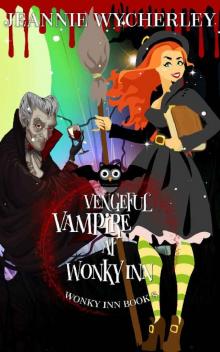 Vengeful Vampire at Wonky Inn: Wonky Inn Book 8
Vengeful Vampire at Wonky Inn: Wonky Inn Book 8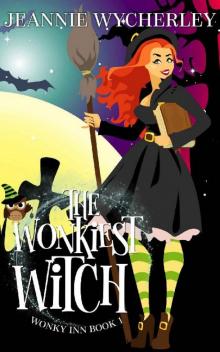 The Wonkiest Witch
The Wonkiest Witch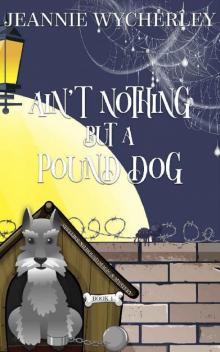 Ain't Nothing but a Pound Dog
Ain't Nothing but a Pound Dog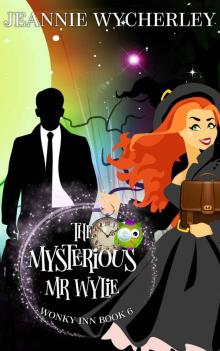 The Mysterious Mr Wylie: Wonky Inn Book 6
The Mysterious Mr Wylie: Wonky Inn Book 6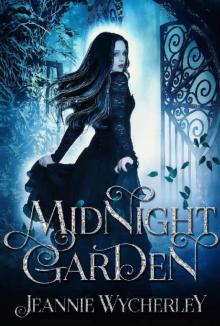 Midnight Garden
Midnight Garden Witching in a Winter Wonkyland: A Wonky Inn Christmas Cozy Mystery
Witching in a Winter Wonkyland: A Wonky Inn Christmas Cozy Mystery The Great Witchy Cake-Off
The Great Witchy Cake-Off The Great Witchy Cake Off: Wonky Inn Book 7
The Great Witchy Cake Off: Wonky Inn Book 7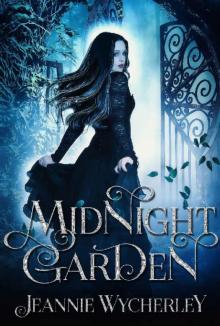 Midnight Garden (The Extra Ordinary World Novella Series Book 1)
Midnight Garden (The Extra Ordinary World Novella Series Book 1)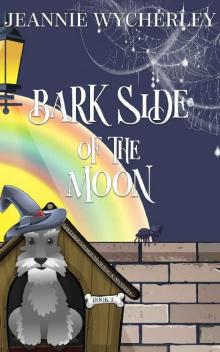 Bark Side of the Moon: A Paranormal Animal Cozy Mystery (Spellbound Hound Magic and Mystery Book 3)
Bark Side of the Moon: A Paranormal Animal Cozy Mystery (Spellbound Hound Magic and Mystery Book 3) A Gaggle of Ghastly Grandmamas: Wonky Inn Book 9
A Gaggle of Ghastly Grandmamas: Wonky Inn Book 9 The Ghosts of Wonky Inn: Wonky Inn Book 2
The Ghosts of Wonky Inn: Wonky Inn Book 2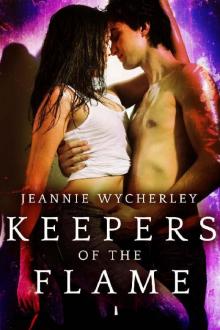 Keepers of the Flame: A love story
Keepers of the Flame: A love story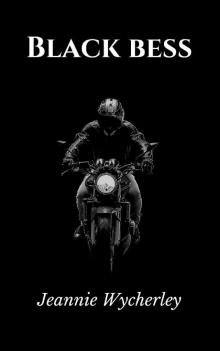 Black Bess
Black Bess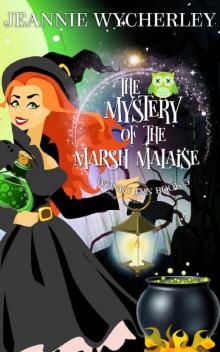 The Mystery of the Marsh Malaise: Wonky Inn Book 5
The Mystery of the Marsh Malaise: Wonky Inn Book 5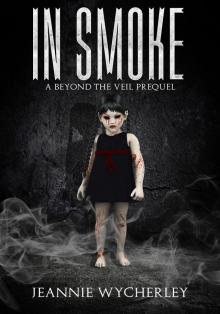 In Smoke eBook ready
In Smoke eBook ready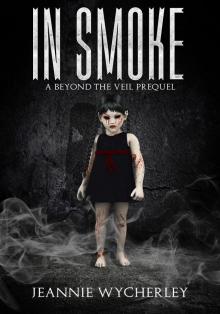 In Smoke
In Smoke